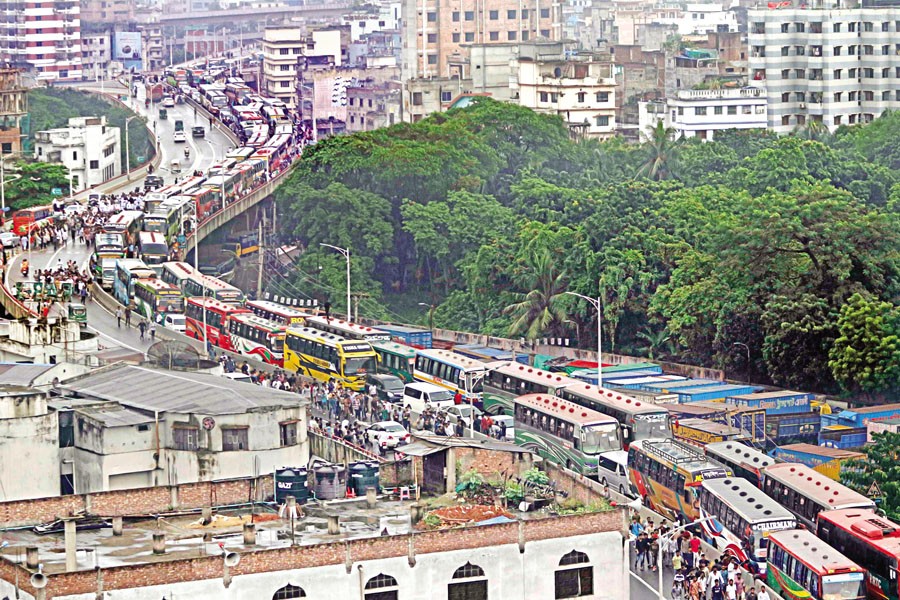
Published :
Updated :

Despite all the hoopla about how Dhaka city's traffic situation is improving thanks to the introduction of metro rail and projects such as the Dhaka Elevated Expressway, these measures are not truly making a dent in the horrendous traffic jams in a city the size of Dhaka. The reality is that only one out of the six metro rails are nearing completion end of October this year and a portion of the elevated expressway has been opened to the public. Years have been spent on prestigious, expensive road and rail infrastructure projects that are years behind completion and this is reflected on the time wasted by the average commuter in Dhaka.
As per a study released recently by Bangladeshi think-tank, Centre for Policy Dialogue (CPD), it has been found that, on average, 23 minutes are lost per hour due to traffic jams in Dhaka. The end result of this waste has a direct impact on productivity lost for millions of people who call the city their home. On top of that, the jams lead to increased fuel consumption, which is detrimental to the environment and out-of-pocket expenditure for people riding their own vehicles.
Though the presence of so many vehicles on roads is leading to all sorts of health issues (due to pollution), yet, it is obvious that current measures being undertaken by the authorities are invariably failing to arrest the situation. It is indeed strange that this city has so many rules for traffic movement, but yet so little enforcement! Certain areas in the city like Mirpur have literally been overrun by so-called 'easy bikes', which are passenger-carriers running on battery. No one needs any sort of license to drive these contraptions and they pick up and drop passengers wherever they like. Similarly, pedal-driven rickshaws have access to major road links from Malibagh to Rampura. So, Dhaka roads are open to all sorts of vehicles to ply as they will.
The failure to deal with such issues has landed the city in the mess it is in today. Although some academicians have been demanding a slew of taxes, like the carbon tax, question would arise as to how practicable it is for Bangladesh. A very large percentage of public transport in the city is served by unfit mini-buses which should have been retired decades ago. They lack not only basic fitness, but like the 'easy bikes', those have drivers who do not pass any test before they're handed the keys to these large vehicles.
Unfortunately, placing a carbon tax on vehicles in Bangladesh will do little to dissuade people from using vehicles. They still need to travel from point A to point B on a daily basis. The only thing it will do is to increase some government revenue whilst leaving the chaotic traffic situation as it is. Instead of carbon tax, the authorities can do what can be implemented much easier because the infrastructure already exists. The railway network has rail lines leading in and out of Dhaka city. Why not introduce shuttle trains during the peak office hours of the week so that people can travel to Dhaka for work, and leave at the end of the day? This has worked perfectly for Kolkata city for decades and it certainly can be done here. Private sector operators can be given contracts to run these services so as not to overburden the state body. While the feasibility study for the Dhaka Circular Rail is ongoing, the current infrastructure can be used to introduce such innovative services to lessen the population pressure on Dhaka city.


 For all latest news, follow The Financial Express Google News channel.
For all latest news, follow The Financial Express Google News channel.